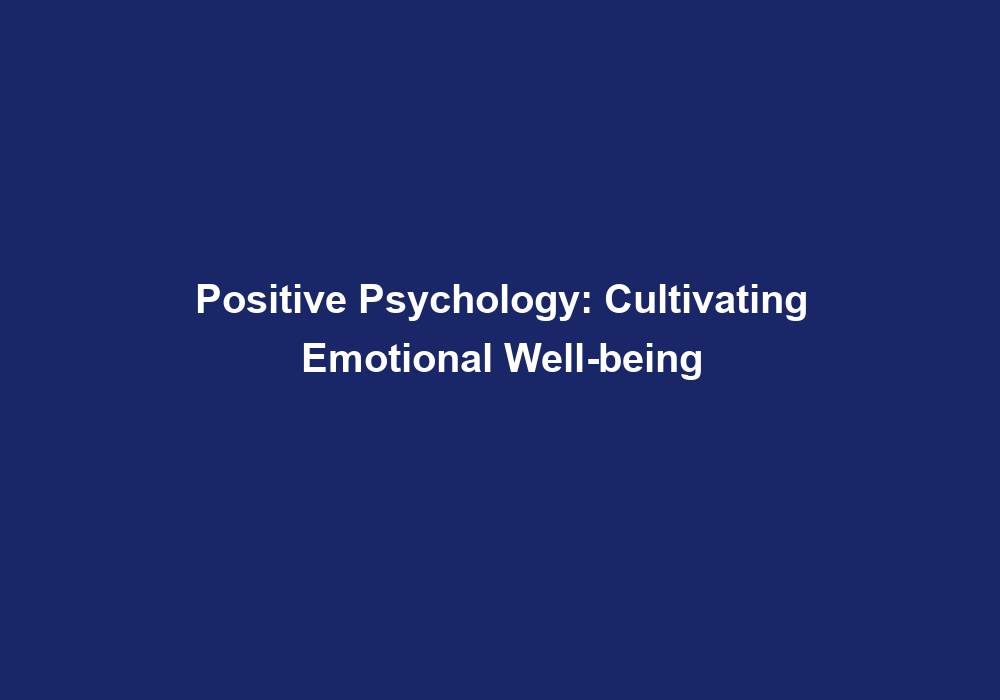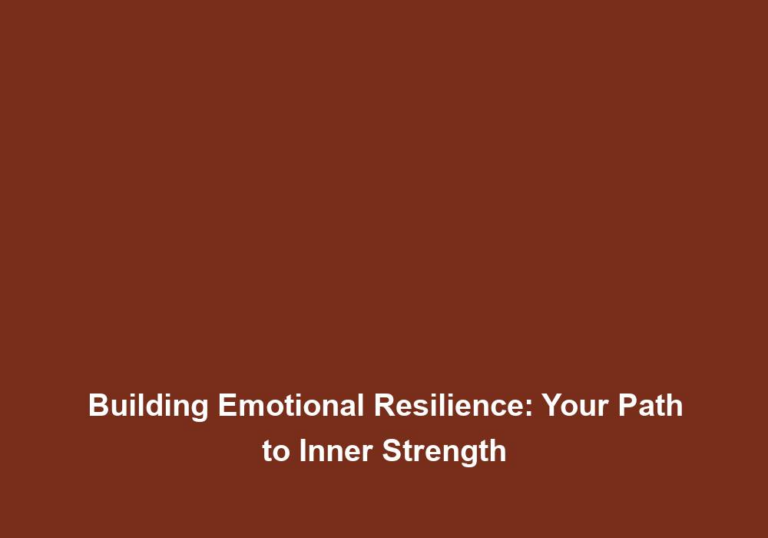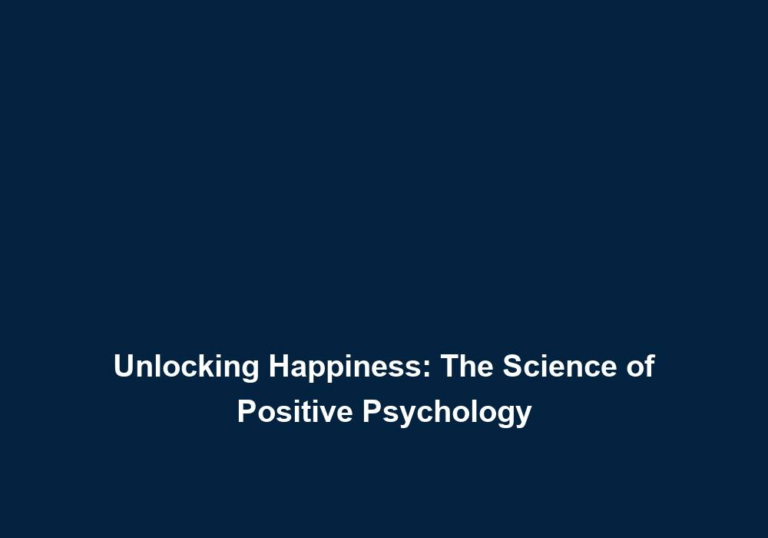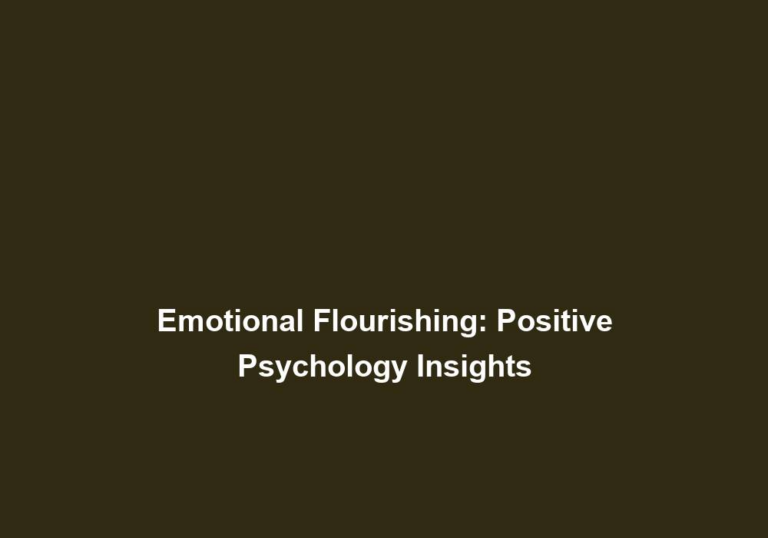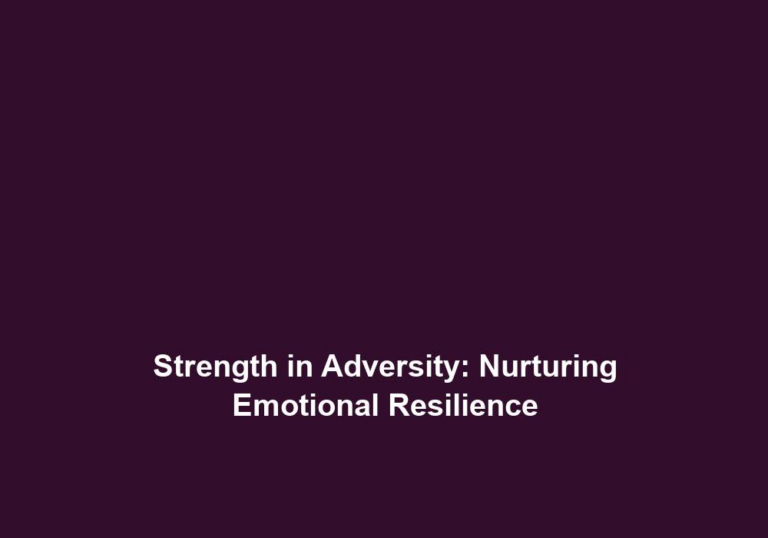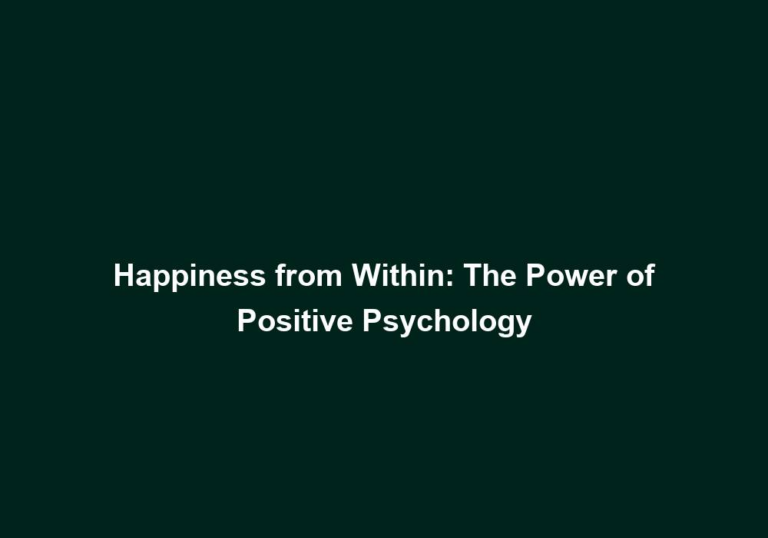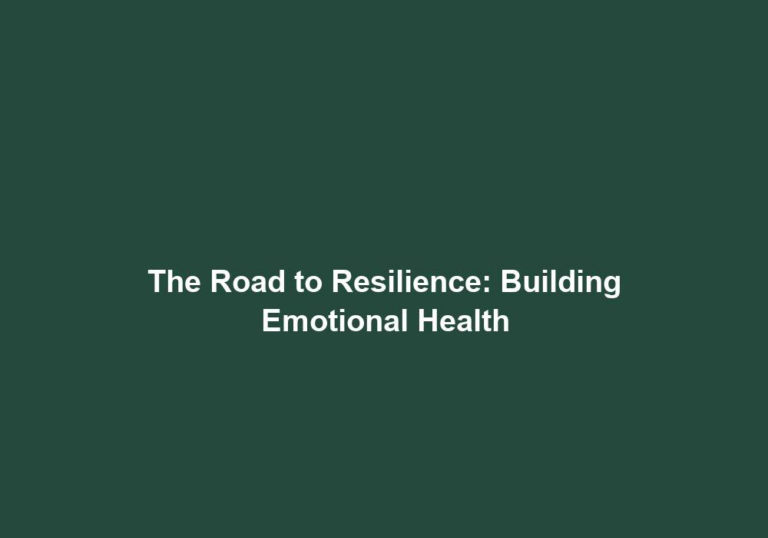Positive Psychology: Cultivating Emotional Well-being
Positive psychology is a field of study that focuses on understanding and promoting well-being, happiness, and resilience. It aims to identify factors that contribute to a fulfilling life and develop strategies to enhance emotional well-being. In this article, we will explore various aspects of positive psychology and how it can be applied to cultivate emotional well-being.
The Power of Positive Thinking
Positive thinking plays a crucial role in cultivating emotional well-being. It involves focusing on the positive aspects of life and maintaining an optimistic outlook. Research suggests that positive thinking can have numerous benefits, including reduced stress, improved health, and enhanced relationships.
Strategies for Positive Thinking
-
Gratitude: Practicing gratitude involves acknowledging and appreciating the good things in life. It can be as simple as keeping a gratitude journal or expressing gratitude to others. By focusing on what we are grateful for, we shift our attention from negative thoughts to positive ones. This can help reframe our mindset and bring more positivity into our lives.
-
Positive Affirmations: Affirmations are positive statements that we repeat to ourselves. They can help reframe negative thoughts and promote a positive mindset. Examples of positive affirmations include “I am capable of achieving my goals” or “I am worthy of love and happiness.” By consistently repeating these affirmations, we can reinforce positive beliefs about ourselves and our abilities.
-
Visualization: Visualization techniques involve creating mental images of desired outcomes or experiences. By visualizing positive scenarios, we can train our minds to focus on the positive and manifest our goals. Visualization can be combined with relaxation techniques, such as deep breathing or meditation, to enhance its effectiveness. This practice helps create a sense of hope and optimism, which can contribute to emotional well-being.
Building Resilience
Resilience is the ability to adapt and bounce back from difficult situations. It is a fundamental aspect of emotional well-being and plays a significant role in navigating life’s challenges. Positive psychology offers valuable insights and strategies to build resilience.
Strategies for Building Resilience
-
Cultivating Optimism: Optimism is a key characteristic of resilient individuals. It involves maintaining a positive outlook and believing in the possibility of positive outcomes, even in the face of adversity. Engaging in positive self-talk and reframing negative situations can help cultivate optimism. By focusing on potential solutions and opportunities for growth, we can develop a resilient mindset.
-
Seeking Social Support: Building strong relationships and seeking support from others is vital for resilience. Connecting with loved ones, joining support groups, or seeking professional help can provide the necessary emotional support during challenging times. Talking about our experiences and sharing our feelings with trusted individuals can help us gain perspective and find strength in difficult situations.
-
Developing Coping Skills: Resilient individuals often possess effective coping skills to deal with stress and adversity. These skills may include problem-solving, emotional regulation, and seeking healthy outlets for stress relief, such as exercise or creative activities. By developing these coping mechanisms, we can better manage difficult emotions and navigate through tough times with resilience.
Finding Meaning and Purpose
Discovering meaning and purpose in life is essential for emotional well-being. Positive psychology emphasizes the importance of aligning our actions and goals with our core values, which leads to a sense of fulfillment and satisfaction.
Strategies for Finding Meaning and Purpose
-
Identify Core Values: Reflect on what truly matters to you and what brings you a sense of fulfillment. These values act as guiding principles and help shape your goals and actions. By aligning our choices with our core values, we can live a more purposeful and meaningful life.
-
Set Meaningful Goals: Set goals that align with your core values and contribute to a greater purpose. Goals that have personal significance are more likely to bring a sense of fulfillment and motivation. Whether it’s pursuing a career that makes a difference or engaging in activities that align with your passions, setting meaningful goals can give your life a sense of direction and purpose.
-
Engage in Meaningful Activities: Seek out activities that bring meaning and purpose to your life. This could include volunteering, pursuing hobbies, or engaging in work that aligns with your passions. By actively participating in activities that resonate with our values and interests, we can experience a deeper sense of fulfillment and purpose.
Cultivating Positive Relationships
Positive relationships play a crucial role in emotional well-being. Nurturing healthy connections and building a support network can enhance happiness, reduce stress, and promote overall well-being.
Strategies for Cultivating Positive Relationships
-
Practice Active Listening: Actively listening to others demonstrates empathy and strengthens the connection. It involves paying attention, being present, and responding in a supportive manner. By practicing active listening, we can deepen our understanding of others, improve communication, and foster stronger relationships.
-
Express Appreciation: Regularly express gratitude and appreciation to the people in your life. A simple thank you or a kind gesture can go a long way in strengthening relationships. By expressing our appreciation, we not only make others feel valued and loved but also enhance our own sense of well-being and connection.
-
Resolve Conflicts Constructively: Conflict is inevitable in relationships, but how we handle it matters. Developing effective communication skills, being open to compromise, and seeking understanding can help resolve conflicts in a constructive manner. By approaching conflicts with empathy and a willingness to find common ground, we can preserve and strengthen our relationships.
Conclusion
Positive psychology provides valuable insights and strategies for cultivating emotional well-being. By focusing on positive thinking, building resilience, finding meaning and purpose, and nurturing positive relationships, individuals can enhance their overall well-being and lead fulfilling lives. Incorporating these strategies into daily life can promote emotional well-being and contribute to a happier and more satisfying existence. Remember, the power to cultivate emotional well-being lies within each of us.
This article was written by a SEO content writing expert fluent in English.

